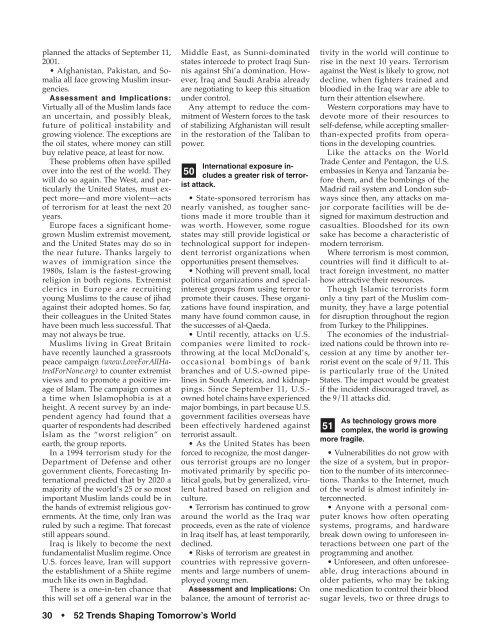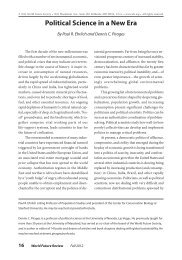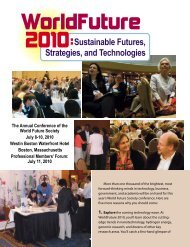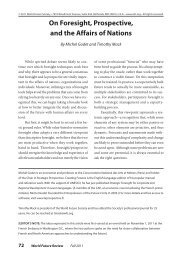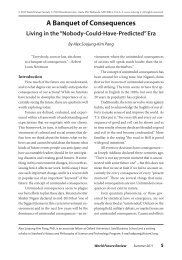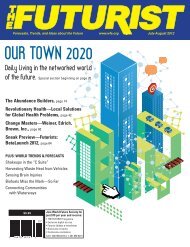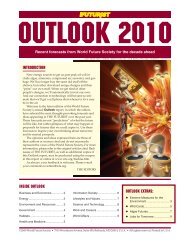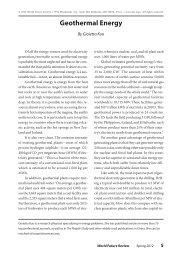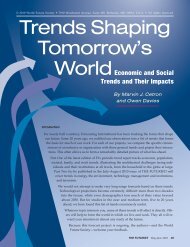52 Trends Shaping Tomorrow's World - World Future Society
52 Trends Shaping Tomorrow's World - World Future Society
52 Trends Shaping Tomorrow's World - World Future Society
Create successful ePaper yourself
Turn your PDF publications into a flip-book with our unique Google optimized e-Paper software.
planned the attacks of September 11,2001.• Afghanistan, Pakistan, and Somaliaall face growing Muslim insurgencies.Assessment and Implications:Virtually all of the Muslim lands facean uncertain, and possibly bleak,future of political instability andgrowing violence. The exceptions arethe oil states, where money can stillbuy relative peace, at least for now.These problems often have spilledover into the rest of the world. Theywill do so again. The West, and particularlythe United States, must expectmore—and more violent—actsof terrorism for at least the next 20years.Europe faces a significant homegrownMuslim extremist movement,and the United States may do so inthe near future. Thanks largely towaves of immigration since the1980s, Islam is the fastest-growingreligion in both regions. Extremistclerics in Europe are recruitingyoung Muslims to the cause of jihadagainst their adopted homes. So far,their colleagues in the United Stateshave been much less successful. Thatmay not always be true.Muslims living in Great Britainhave recently launched a grassrootspeace campaign (www.LoveForAllHatredForNone.org)to counter extremistviews and to promote a positive imageof Islam. The campaign comes ata time when Islamophobia is at aheight. A recent survey by an independentagency had found that aquarter of respondents had describedIslam as the “worst religion” onearth, the group reports.In a 1994 terrorism study for theDepartment of Defense and othergovernment clients, Forecasting Internationalpredicted that by 2020 amajority of the world’s 25 or so mostimportant Muslim lands could be inthe hands of extremist religious governments.At the time, only Iran wasruled by such a regime. That forecaststill appears sound.Iraq is likely to become the nextfundamentalist Muslim regime. OnceU.S. forces leave, Iran will supportthe establishment of a Shiite regimemuch like its own in Baghdad.There is a one-in-ten chance thatthis will set off a general war in theMiddle East, as Sunni-dominatedstates intercede to protect Iraqi Sunnisagainst Shi’a domination. However,Iraq and Saudi Arabia alreadyare negotiating to keep this situationunder control.Any attempt to reduce the commitmentof Western forces to the taskof stabilizing Afghanistan will resultin the restoration of the Taliban topower.n 50International exposure includesa greater risk of terroristattack.• State-sponsored terrorism hasnearly vanished, as tougher sanctionsmade it more trouble than itwas worth. However, some roguestates may still provide logistical ortechnological support for independentterrorist organizations whenopportunities present themselves.• Nothing will prevent small, localpolitical organizations and specialinterestgroups from using terror topromote their causes. These organizationshave found inspiration, andmany have found common cause, inthe successes of al-Qaeda.• Until recently, attacks on U.S.companies were limited to rockthrowingat the local McDonald’s,occasional bombings of bankbranches and of U.S.-owned pipelinesin South America, and kidnappings.Since September 11, U.S.-owned hotel chains have experiencedmajor bombings, in part because U.S.government facilities overseas havebeen effectively hardened againstterrorist assault.• As the United States has beenforced to recognize, the most dangerousterrorist groups are no longermotivated primarily by specific politicalgoals, but by generalized, virulenthatred based on religion andculture.• Terrorism has continued to growaround the world as the Iraq warproceeds, even as the rate of violencein Iraq itself has, at least temporarily,declined.• Risks of terrorism are greatest incountries with repressive governmentsand large numbers of unemployedyoung men.Assessment and Implications: Onbalance, the amount of terrorist ac-tivity in the world will continue torise in the next 10 years. Terrorismagainst the West is likely to grow, notdecline, when fighters trained andbloodied in the Iraq war are able toturn their attention elsewhere.Western corporations may have todevote more of their resources toself-defense, while accepting smallerthan-expectedprofits from operationsin the developing countries.Like the attacks on the <strong>World</strong>Trade Center and Pentagon, the U.S.embassies in Kenya and Tanzania beforethem, and the bombings of theMadrid rail system and London subwayssince then, any attacks on majorcorporate facilities will be designedfor maximum destruction andcasualties. Bloodshed for its ownsake has become a characteristic ofmodern terrorism.Where terrorism is most common,countries will find it difficult to attractforeign investment, no matterhow attractive their resources.Though Islamic terrorists formonly a tiny part of the Muslim community,they have a large potentialfor disruption throughout the regionfrom Turkey to the Philippines.The economies of the industrializednations could be thrown into recessionat any time by another terroristevent on the scale of 9/11. Thisis particularly true of the UnitedStates. The impact would be greatestif the incident discouraged travel, asthe 9/11 attacks did.n 51As technology grows morecomplex, the world is growingmore fragile.• Vulnerabilities do not grow withthe size of a system, but in proportionto the number of its interconnections.Thanks to the Internet, muchof the world is almost infinitely interconnected.• Anyone with a personal computerknows how often operatingsystems, programs, and hardwarebreak down owing to unforeseen interactionsbetween one part of theprogramming and another.• Unforeseen, and often unforeseeable,drug interactions abound inolder patients, who may be takingone medication to control their bloodsugar levels, two or three drugs to30 • <strong>52</strong> <strong>Trends</strong> <strong>Shaping</strong> Tomorrow’s <strong>World</strong>


